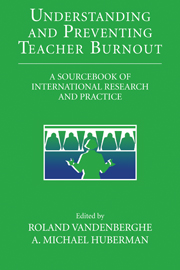Book contents
- Frontmatter
- Contents
- Contributors
- List of Figures
- List of Tables
- Foreword
- Introduction: Burnout and the Teaching Profession
- PART ONE TEACHER BURNOUT: A CRITICAL REVIEW AND SYNTHESIS
- PART TWO TEACHER BURNOUT: PERSPECTIVES AND REMEDIES
- PART THREE TEACHER BURNOUT: A RESEARCH AND INTERVENTION AGENDA
- 19 Teacher Burnout: A Research Agenda
- 20 Beyond Individual Burnout: A Perspective for Improved Schools. Guidelines for the Prevention of Burnout
- References
- Index
19 - Teacher Burnout: A Research Agenda
Published online by Cambridge University Press: 06 January 2010
- Frontmatter
- Contents
- Contributors
- List of Figures
- List of Tables
- Foreword
- Introduction: Burnout and the Teaching Profession
- PART ONE TEACHER BURNOUT: A CRITICAL REVIEW AND SYNTHESIS
- PART TWO TEACHER BURNOUT: PERSPECTIVES AND REMEDIES
- PART THREE TEACHER BURNOUT: A RESEARCH AND INTERVENTION AGENDA
- 19 Teacher Burnout: A Research Agenda
- 20 Beyond Individual Burnout: A Perspective for Improved Schools. Guidelines for the Prevention of Burnout
- References
- Index
Summary
Burnout has long been recognized as an important stress-related problem for people who work in interpersonally oriented occupations, such as the human services. In these occupations, the relationship between providers and recipients is central to the job, and the nature of the work (whether it be service, treatment, or education) can be highly emotional. Unlike unidimensional models of stress, burnout has been conceptualized in terms of three interrelated components: emotional exhaustion, depersonalization, and reduced personal accomplishment (Maslach and Jackson, 1986). Emotional exhaustion refers to feelings of being emotionally overextended and depleted of one's emotional resources; depersonalization refers to a negative, callous, or excessively detached response to other people (often the recipients of one's service or care); and reduced personal accomplishment refers to a decline in one's feelings of competence and successful achievement in one's work. In terms of outcomes, burnout has been linked to decrements in both psychological and physical well-being, and it appears to be a factor in various problem behaviors, both on the job and in the home (see Cordes and Dougherty, 1993; Schaufeli, Maslach, and Marek, 1993).
Teaching shares with other human service professions the central role of working in a close relationship with recipients (i.e., students). However, teaching is unique in that these working relationships are dealt with en masse within a classroom (“batch processing”), unlike the more individual and sequential focus of other human services.
- Type
- Chapter
- Information
- Understanding and Preventing Teacher BurnoutA Sourcebook of International Research and Practice, pp. 295 - 303Publisher: Cambridge University PressPrint publication year: 1999
- 110
- Cited by



